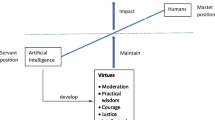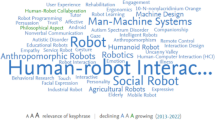Abstract
The article explores the effects increasing automation has on our conceptions of human agency. We conceptualize the central features of human agency as ableness, intentionality, and rationality and define responsibility as a central feature of moral agency. We discuss suggestions in favor of holding AI systems moral agents for their functions but join those who refute this view. We consider the possibility of assigning moral agency to automated AI systems in settings of machine-human cooperation but come to the conclusion that AI systems are not genuine participants in joint action and cannot be held morally responsible. Philosophical issues notwithstanding, the functions of AI systems change human agency as they affect our goal setting and pursuing by influencing our conceptions of the attainable. Recommendation algorithms on news sites, social media platforms, and in search engines modify our possibilities to receive accurate and comprehensive information, hence influencing our decision making. Sophisticated AI systems replace human workforce even in such demanding fields as medical surgery, language translation, visual arts, and composing music. Being second to a machine in an increasing number of fields of expertise will affect how human beings regard their own abilities. We need a deeper understanding of how technological progress takes place and how it is intertwined with economic and political realities. Moral responsibility remains a human characteristic. It is our duty to develop AI to serve morally good ends and purposes. Protecting and strengthening the conditions of human agency in any AI environment is part of this task.
Access this chapter
Tax calculation will be finalised at checkout
Purchases are for personal use only
Similar content being viewed by others
References
Brożek, B., Janik, B.: Can artificial intelligence be moral agents? New Ideas Psychol. 54, 101–106 (2019)
Ciardo, F., De Tommaso, D., Beyer, F., Wykowska, A.: Reduced sense of agency in human-robot interaction. In: Ge, S.S., et al. (eds.) ICSR 2018. LNCS (LNAI), vol. 11357, pp. 441–450. Springer, Cham (2018). https://doi.org/10.1007/978-3-030-05204-1_43
Esteva, A., Kuprel, B., Novoa, R., et al.: Dermatologist-level classification of skin cancer with deep neural networks. Nature 542, 115–118 (2017)
FAA: Operational Use of Flight Path Management Systems. Final Report. FAA (2013)
https://www.faa.gov/aircraft/air_cert/design_approvals/human_factors/media/oufpms_report.pdf. Accessed 28 Jan 2020
Fossa, F.: Artificial moral agents: moral mentors or sensible tools? Ethics Inf. Technol. 20, 115–126 (2018)
Grace, K., Salvatier, J., Dafoe, A., Zhang, B., Evans, O.: Viewpoint: when will AI exceed human performance? Evidence from AI experts. J. Artif. Intell. Res. 62, 729–754 (2018)
Gunkel, D.J.: The Machine Question: Critical Perspectives on AI, Robots, and Ethics. MIT Press, Cambridge (2012)
Hakli, R., Mäkelä, P.: Moral responsibility of robots and hybrid agents. Monist 102(2), 259–275 (2019)
Hallamaa, J.: Yhdessä toimimisen etiikka [The Ethics of cooperation]. Gaudeamus, Helsinki (2017)
Kant, I.: Grundlegung zur Metaphysik der Sitten. Schriften zur Ethik und Religionsphilosophie. Erster Teil. Wissenschaftliche Buchgesellschaft, Darmstadt (1983)
Landry, S.J., Karwowski, W.: Advances in Human Factors and Ergonomics Series: Advances in Human Aspects of Aviation. CRC Press LLC, London (2012)
Latour, B.: Reassembling the Social: An Introduction to Actor-Network Theory. Oxford University Press, New York (2005)
Leikas, J., Koivisto, R., Gotcheva, N.: Ethical framework for designing autonomous intelligent systems. J. Open Innov. Technol. Mark. Complex. 5(1), 18–30 (2019)
Limerick, H., Coyle, D., Moore, J.W.: The experience of agency in human-computer interactions: a review. Front. Hum. Neurosci. 8, 643 (2014)
Lin, P., Abney, K., Jenkins, R. (eds.): Robot ethics 2.0: From Autonomous Cars to Artificial Intelligence. Oxford Scholarship Online (2017)
Marr, B.: Artificial Intelligence in Practice: How 50 Successful Companies Used AI and Machine Learning to Solve Problems. Wiley, Chichester (2019)
Mele, A.R.: Autonomous Agents: From Self-Control to Autonomy. Oxford University Press, New York (1995)
Misselhorn, C.: Collective agency and cooperation in natural and artificial systems. In: Misselhorn, C. (ed.) Collective Agency and Cooperation in Natural and Artificial Systems. PSS, vol. 122, pp. 3–24. Springer, Cham (2015). https://doi.org/10.1007/978-3-319-15515-9_1
Moore, J.W.: What is a sense of agency and why does it matter? Front. Psychol. 7, 1272 (2016)
Morriss, P.: Power. A Philosophical Approach, 2nd edn. Manchester University Press, Manchester (2002)
Mou, Y., Xu, K.: The Media inequality: comparing the initial human-human and human-AI social interactions. Comput. Hum. Behav. 72, 432–440 (2017)
Needham, J.: We are the robots: is the future of music artificial? FACT Magazine. https://www.factmag.com/2017/02/19/we-are-the-robots-could-the-future-of-music-be-artificial. Accessed 28 Jan 2020
Ollila, M.-R: Tekoälyn etiikkaa [Ethics of artificial intelligence]. Otava, Helsinki (2019)
Rochat, P.: Others in Mind: Social Origins of Self-consciousness. Cambridge University Press, New York (2009)
Smith, C.: To Flourish or Destruct: A Personalist Theory of Human Goods, Motivations, Failure and Evil. The University of Chicago Press, Chicago (2015)
Strasser, A.: Can artificial systems be part of a collective action? In: Misselhorn, C. (ed.) Collective Agency and Cooperation in Natural and Artificial Systems. PSS, vol. 122, pp. 205–218. Springer, Cham (2015). https://doi.org/10.1007/978-3-319-15515-9_11
Thomas of Aquinas: Summa Theologiae. Pars prima et prima secundae. Marietti, Torino (1952)
Thompson, Clive: What will happen when machines write songs just as well as your favorite musician? Mother Jones. https://www.motherjones.com/media/2019/03/what-will-happen-when-machines-write-songs-just-as-well-as-your-favorite-musician. Accessed 28 Jan 2020
Tuomela, R.: The Philosophy of Sociality: A Shared Point of View. Oxford University Press, Oxford (2007)
Visala, A.: Tekoälyn teologiasta [Remarks on theology of artificial intelligence]. Teologinen Aikakauskirja 123(5), 402–417 (2018)
von Wright, G.H.: The Varieties of Goodness. Routledge and Kegan Paul, London (1968)
Zdravkova, K.: Reconsidering human dignity in the new era. New Ideas Psychol. 54, 112–117 (2019)
Acknowledgement
This research was supported by the project Ethical AI for the Governance of Society (ETAIROS, grant #327352) funded by the Strategic Research Council (Academy of Finland).
Author information
Authors and Affiliations
Corresponding author
Editor information
Editors and Affiliations
Rights and permissions
Copyright information
© 2020 Springer Nature Switzerland AG
About this paper
Cite this paper
Hallamaa, J., Kalliokoski, T. (2020). How AI Systems Challenge the Conditions of Moral Agency?. In: Rauterberg, M. (eds) Culture and Computing. HCII 2020. Lecture Notes in Computer Science(), vol 12215. Springer, Cham. https://doi.org/10.1007/978-3-030-50267-6_5
Download citation
DOI: https://doi.org/10.1007/978-3-030-50267-6_5
Published:
Publisher Name: Springer, Cham
Print ISBN: 978-3-030-50266-9
Online ISBN: 978-3-030-50267-6
eBook Packages: Computer ScienceComputer Science (R0)




